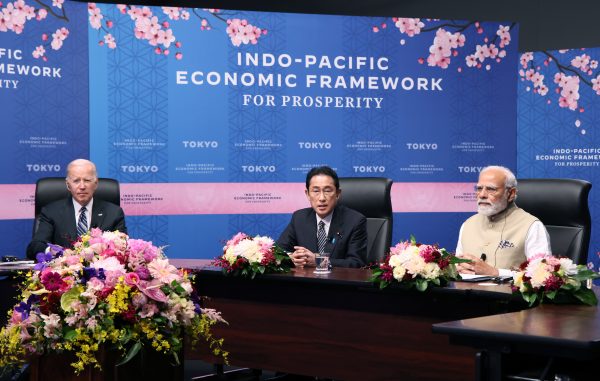The major achievement coinciding with the launch event in May was the number and diversity of participants that the United States succeeded in bringing on board. At this stage the participants are Australia, Brunei, Fiji, India, Indonesia, Japan, South Korea, Malaysia, New Zealand, the Philippines, Singapore, Thailand and Vietnam.
Washington’s unwillingness to negotiate market access brings into question its ability to offer serious concessions and highlights the domestic political constraints it faces in negotiating free trade agreements. The decision not to pursue market access has led negotiators to pursue a non-traditional approach to economic engagement. This approach leverages private sector expertise and investment in areas such as critical minerals and the clean economy rather than through tariff liberalisation.
A bipartisan chorus of sceptics has emerged in Congress seeking additional transparency on the negotiating process and the IPEF’s goals. US Representative Adrian Smith said in October 2022 that initiatives such as the IPEF are ‘no substitute’ for formal free trade agreements.
After scoping the negotiating objectives and solidifying support for specific policy pillars, the parties put forth a series of ministerial statements that confirmed the four IPEF negotiating pillars. Like other non-traditional economic arrangements, the IPEF is a flexible framework that allows countries to join specific pillars without having to join them all. But the arrangement does obligate countries to join single pillars in their entirety.
Another notable feature of the IPEF is that the parties have sought to avoid any mention of China in the lead-up to negotiations, instead seeking to create what they regard as an affirmative agenda in the region. The four IPEF pillars are trade, supply chains, clean economy and fair economy.
The trade pillar is divided into nine additional subsets. Short of laying out concrete negotiating objectives or elucidating how enforcement and dispute resolution would occur, the September 2022 ministerial meeting functioned largely as a signalling exercise.
While some stakeholders had hoped for an ‘early harvest’ — where smaller agreements on more targeted areas are completed ahead of others — US Trade Ambassador Katherine Tai described talk of an early harvest as ‘premature’. Other government officials highlight the belief among negotiators that the breadth and complexity of the trade pillar mean it will remain one of the more challenging and time-consuming pillars.
The second IPEF pillar focusses on supply chains — a topic that garnered the most enthusiasm among participating countries in the lead-up to the ministerial meeting. This pillar aims to improve supply chain transparency, create an information-sharing and crisis response mechanism, and establish criteria to govern critical sectors and goods. All the participating countries have suffered supply chain setbacks due to the COVID-19 pandemic and systemic shocks such as growing calls to diversify away from China.
As Washington explores policies to spur faster decoupling from China, the IPEF supply chain pillar could help identify which countries — and their respective private sector entities — can play a greater role in building more secure supply chains. Supply chain pillar outcomes could eventually yield friction-reducing results akin to the benefits offered by a free trade agreement, though these outcomes would depend on a substantial increase in technical assistance.
Other non-traditional frameworks such as the Quad and the US–EU Trade and Technology Council have similarly sought to build more secure and resilient supply chains. But they also demonstrate the difficulties countries face in producing concrete supply chain outcomes — particularly due to private sector reluctance to share proprietary data.
The clean economy pillar seeks to catalyse investments that reduce emissions, improve sustainability and grow marketplaces for cleaner economies, such as carbon removal technologies. Stakeholders in the United States have looked to the US Development Finance Corporation (DFC) for funding assistance for the IPEF’s clean economy pillar. But the DFC’s relatively limited statutory authority and small budget preclude it from playing an outsize role in development and climate finance.
The fair economy pillar seeks greater policy convergence among participants on capacity building, cooperation and transparency. It claims it will do this through ‘preventing and combatting corruption, curbing tax evasion and enhancing transparency, recognising the importance of fairness, inclusiveness, the rule of law, accountability and transparency’. But it is unclear which tangible outcomes partners will be able to achieve on this pillar and whether it will incentivise domestic policy change.
The tentative plan is for the parties to convene every other month to hold what will resemble formal ‘rounds’ of trade negotiations. Washington aims to conclude IPEF negotiations ahead of the US-hosted Asia Pacific Economic Cooperation summit in November 2023.
The details remain elusive, casting doubt on whether countries can reach an agreement by that deadline. Still, the ambition to convene often and formally signals that the parties do not want the IPEF to devolve into a series of meetings for meetings’ sake.
Emily Benson is a Fellow with the Scholl Chair in International Business at the Center for Strategic and International Studies (CSIS) in Washington, DC.
Aidan Arasasingham is a Program Coordinator and Research Assistant at CSIS.

